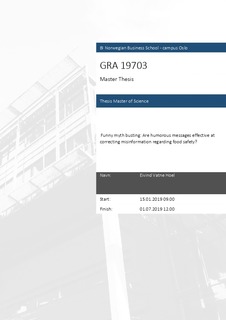Funny myth busting: Are humorous messages effective at correcting misinformation regarding food safety?
Master thesis
Permanent lenke
http://hdl.handle.net/11250/2625396Utgivelsesdato
2019Metadata
Vis full innførselSamlinger
- Master of Science [1621]
Sammendrag
Food safety misinformation is highly prevalent among the population and could
potentially be increased by individuals efforts reduce waste, and stakeholders
promoting efforts such as
The present body of literature has provided insight in the “art” of correcting
misinformation in many different topics. However, the topic of food safety has not
received such attention. This paper aims to explore the effectiveness corrective
messages has on correcting misinformation on a food myth. The study moreover
looks into the tone of the message (humorous and non-humorous) and endorser type
(expert vs celebrity) is able to correct a current held misinformation.
Using a mixed experimental design with between- and within subjects
variables, repeated measures ANOVA analysis reveal that the the corrective
information is successful in adjusting participants (n = 157) belief in the food safety
myth. However, the current study is not able to provide proof that a humorous
correction differs in effectiveness from a non-humorous correcting. Likewise, for
endorser type (celebrity vs expert) no significant difference in misinformation
correction is found. Lastly, there are no significant differences in corrective
effectiveness when comparing humorous and non-humorous messages with expert
and celebrity endorsers. However there are tendencies in the data that indicates at
marginally insignificant level that the combination expert endorser and nonhumorous
message is more effective myth buster.
Beskrivelse
Masteroppgave(MSc) in Master of Science in Strategic Marketing Management - Handelshøyskolen BI, 2019
